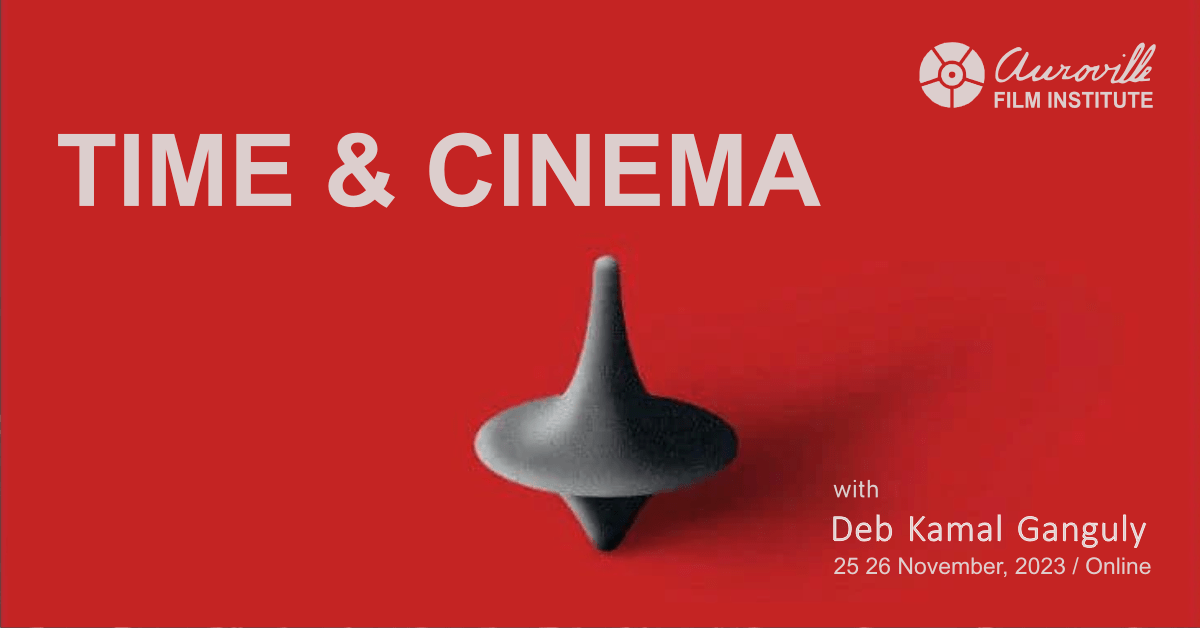Specially Curated Sessions of Film Analysis and Film Appreciation
25th & 26th November 2023, 14:30 to 19:00 IST _Online.
Total contact hours: 08/10
COURSE OVERVIEW:
The relationship between ‘time’ and the form of cinema has been one of the key questions that have captured the thought and imagination of filmmakers and film theorists since the early days of cinema. As cinema rolls out before the eyes of the viewers in a definite clock time like music, in an uninterrupted way, the initial similarity between the musical form and cinematic form in terms of generalized/abstract temporality was perhaps the benign beginning of this trail of thought. The complexity starts manifesting, as cinema becomes a powerful form of narrative expression with its capacity to move effortlessly between the ‘present’ and the ‘past’ of narrative, at times even showing capabilities providing glimpses of the ‘future’ of narrative. This dimension of ‘narrative time’ further becomes intensified through the subjective/intersubjective positions of the cinematic acts of remembrances and imaginations. The fibers of cinematic temporality get additional artistic articulation as theoretical understanding of form of cinema started getting comprehended as multiplicities of human (anthropocentric) and a-human (biological, organic, non-organic, i.e. non-anthropocentric) temporalities, as shadow imprints (‘imprinted time’) from a pre-existing, now absent reality. On the other hand the biological lived time (riding upon the clock-time of the actual duration of the film) spent by the viewer experiencing the film also got further differentiated in terms of complex webs of waxing and waning containing affective concentrations, dilations, animating various overlapping modes of temporal flows saturating and overwhelming different layers of reception and cognition within the consciousness of the viewer.
Taking examples from various eras of cinema, the course would offer a comprehensive view about the vexed issue of cinema and categories of time. The course would also indicate towards analytical tools with respect to revisiting the experience of certain cinematic pieces, as the medium of cinema can suitably record motion, occurrence, change of states, hint towards ‘series of events’, and further as the form of cinema can playfully arrange, rearrange, merge and coalesce the ‘quanta’ of definite and indefinite fragments of temporality.
PARTICIPANT PROFILE:
Calling : Film-makers, Film-writers, Academicians, Editors, Sound Designers, Journalists and cinema explorers of all kinds interested in:
i) in the multifaceted and complex relationship between ‘time’ and ‘cinema’, as modes of cinematic creativity and artistic expression;
ii) in understanding how cinematic temporalities become integral components of experience of cinema;
iii) in comprehending the unique propensity of ontological form of cinema towards manifestations of time.
FACULTY – DEB KAMAL GANGULY:
An alumnus from Satyajit Ray Film and Television Institute (SRFTI), Kolkata, Deb Kamal Ganguly is an independent filmmaker, researcher and teacher of cinematic arts. He has taught for 08 years (2012-2020) and designed curriculum in Film and Television Institute of India (FTII), Pune, in the departments of Film Editing, Film Direction and Screen Studies; and as a guest faculty in National Institute of Design (NID), Ahmedabad, Flame University, Pune, Kalinga Institute of Industrial Technology, Bhubaneswar. Ganguly’s works have been published under special curator-ship from Lowave, Paris; his video art featured in the exhibition ‘Indian Highway’ and showcased in galleries of various cities of Europe and Asia. His films done in the capacity of editor, script-writer and sound designer have been shown in competitive sections of various international festivals and received recognition, including ‘Tiger Award for Shorts’ in Rotterdam (IFFR 2007). Ganguly has presented papers in various international and national seminars and conferences on various themes related to cinema, Deleuze studies, visual art, interfaces of art practices, translation studies, collective memory, Bengal studies, Media studies, pedagogy of cinema, film editing as a discipline, immersive sound etc including CARA-CILECT conference in Witwatersrand University, Johannesburg (2018), CILECT conference in VGIK, Moscow (2019), Lithuanian Academy of Music and Theater (2019). He is a participant of an international project for artistic research involving BRICS countries, being the coordinator for India (2018).
BASELINE CONTRIBUTION TO CONFIRM PARTICIPATION:
₹ 1200 – For Participants from India and SAARC Nations
€ 30 – For Other International Participants
Voluntary Contribution for Aurovilians (Only for those who live and work in Auroville)
(We invite you to contribute over and above the baseline – voluntarily, if you wish)
CERTIFICATES:
Certificates of participation will be issued to those who fill up this Certificate Issuance Form.
QUERIES:
For queries, if any, please write to: support_filminstitute@auroville.org.in
or call / message +91 9969879319 (whatsapp and telegram only)

